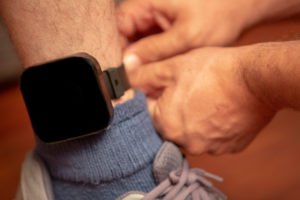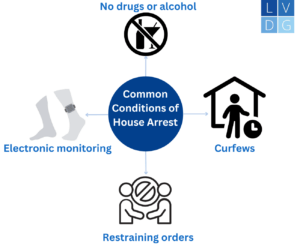
House arrest in Nevada is a type of alternative sentencing that allows you to live at home instead of jail or prison while awaiting trial (“pretrial release”) or serving a sentence. During house arrest, you have to wear an electronic monitoring anklet.
Five key things to know about house arrest in Nevada are:
- While on house arrest, you may have to submit to random alcohol and drug testing.
- Giving up your passports and firearms is usually another condition.
- Depending on your case, you may be allowed to go to work, school, counseling, rehab, court, doctor’s appointments, and other court-approved activities.
- Violating your house arrest terms will result in you being remanded to jail or prison.
- In Clark County, you are assigned to one of three Electronic Monitoring levels:
| High Level |
|
| Medium Level |
You can go about normal daily activities, and having a residence is required. |
| Low Level |
You do not have a curfew (unless you are a juvenile), and you can move freely within Clark County unless the court says otherwise. It is also not required that you have a residence. |
In this article, our Las Vegas criminal defense attorneys discuss:
- 1. What is house arrest?
- 2. How does house arrest work in Nevada?
- 3. What qualifies me for house arrest?
- 4. What happens when I violate the terms of my house arrest?
- 5. How much does it cost for house arrest?
- 6. Can I have a cell phone?
- 7. Can I drink on house arrest?
- Additional reading
1. What is house arrest?
A type of alternative sentencing in Nevada, house arrest is when a Nevada court allows you to forgo jail by instead staying home for a certain period of time under electronic monitoring.
While serving house arrest, you must comply with any requirements the judge may order such as:
- frequent drug testing,
- submission to searches at any time by law enforcement, and
- relinquishing firearms and passports.
When you can get house arrest
A judge may impose house arrest at one of two points during a criminal case:
- After you are arrested and awaiting trial. The typical scenario is that you can pay the required bail, but the criminal charges are too serious for you to have total freedom of travel.
- When you are convicted and the judge imposes a sentence. Judges may grant you house arrest instead of – or in addition to – prison. You are usually entered into the Nevada Department of Public Safety’s Intensive Supervision Program, which monitors you for the duration of the house arrest.
If a judge grants you house arrest, you can typically be released and put on house arrest that same day.1

The Las Vegas Metropolitan Police Department uses a GPS-based EMP system called Omnilink.
2. How does house arrest work in Nevada?
In Clark County, house arrest is typically referred to as the “Electronic Monitoring Program” (or EMP) because you are required to wear an electric monitoring device on your ankle that tracks your real-time location.
Note that when police say “house arrest”, they are typically referring just to High Level EMP, as opposed to Medium- or Low Level. That is because High Level EMP is the only level requiring you to remain in your residence for most of the time.
While under house arrest you may go only to and from the court-approved locations and nowhere else unless the court allows otherwise. You cannot even stop somewhere that is on the way.
Types of tracking devices
Most people on electronic monitoring are outfitted with a GPS active tracking tether, which relies on satellite technology to track your location and transmit it to the police at regular intervals. Police can also program “no-zones” into the anklet (called “geofencing”), and they are notified when you venture into an excluded location.
“GPS Passive trackers” are similar to the active tracker. The main difference is that passive trackers do not transmit the information in real-time; instead, they save your information, and the police or probation officers can access it later on.
3. What qualifies me for house arrest?
It depends on the case and the underlying charges or convictions. Obviously, Nevada judges favor you if you:
- are cooperative,
- are non-violent,
- have a minimal criminal history, and
- are not a flight risk.
Your attorney usually has to request house arrest and then convince the judge that you deserve it and will abide by the rules. Sometimes a parole board recommends you for house arrest.
4. What happens when I violate the terms of my house arrest?
Law enforcement receives an alert if you even tamper with your anklet, break curfew or go near prohibited areas (called “exclusion zones” such as a victim’s home). You then risk losing house arrest privileges and being sent to jail or Nevada State Prison.
If the equipment merely malfunctioned or you had an innocent accident, the judge might not impose any punishment.2

5. How much does it cost for house arrest?
In Las Vegas Municipal Court, house arrest costs $12 a day, plus a one-time $100 administrative fee.3
Law enforcement actually prefers house arrest to incarceration because it is less work and less costly for them.
6. Can I have a cell phone?
You need a landline or a cell phone in order to go onto electronic monitoring in the first place in Nevada. Though the judge may restrict who you can communicate with and whether you can access the internet.
7. Can I drink on house arrest?
If you are on house arrest in Nevada, you must abstain from alcohol.
You may be required to wear a SCRAM ( Secure Continuous Remote Alcohol Monitor) device, which measures your alcohol concentration on an hourly basis through the skin (called “transdermal monitoring”). If the SCRAM detects alcohol, it will notify law enforcement.
Breathalyzers
In some cases, the judge may require that you keep a breathalyzer monitor to breathe into on demand. These devices also photograph you during the test to deter you from cheating.
In DUI cases, you may need to install an ignition interlock device (IID) in your car as a condition of being able to drive. The IID is a breathalyzer attached to your steering wheel, and it disables your car if detects alcohol on your breath.

House arrest is more common in gross misdemeanor and felony cases than in misdemeanor cases.
Additional reading
For more in-depth information, refer to these scholarly articles:
- Home as Prison: The Use of House Arrest – Federal Probation.
- Between the ‘Home’ and ‘Institutional’ Worlds: Tensions and Contradictions in the Practice of House Arrest – Critical Criminology.
- House Arrest: A Critical Analysis of an Intermediate-Level Penal Sanction – University of Pennsylvania Law Review.
- A Brief History of House Arrest and Electronic Monitoring – Northern Kentucky Law Review.
- Exploring the Option of House Arrest – Federal Probation.
Legal References
- Nevada Revised Statute 209.429; NRS 209.392; NRS 209.3925; NRS 176A.440. NRS 212.220. Nevada Department of Corrections Administrative Regulation 523. See also Blandino v. Lombardo, (2021) 483 P.3d 542. See also Long Ngoc Tu v. Eighth Judicial Dist. Court of Nev. (2019) 453 P.3d 399. Note that The Nevada Department of Public Safety offers four programs that allow you to serve all or some of the sentence through home confinement: 305 Program for DUI offenders, 317 Program for non-violent offenders, 184 Program for Drug Court participants, 298 Program for ill or disabled offenders (“compassionate release”). House arrest is also referred to as “HA”, “home confinement” or “home detention”.
- Same.
- Municipal Court Resources, House Arrest, Las Vegas Municipal Court.

